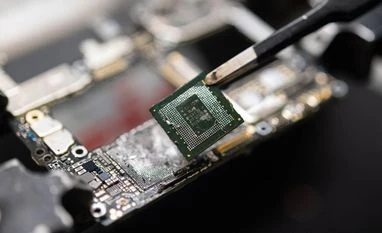Israeli company Tower Semiconductor’s preliminary talks with several Indian companies for setting up a joint venture fab plant, involving the transfer of chip technology, have been tepid.
A top management team from Tower, led by CEO Russell C Ellwanger, was in India last week and met Minister of State for IT and Electronics Rajeev Chandrasekhar.
A senior government official confirmed that Tower executives met four-five Indian companies “but we believe there is not much response to the proposal from these companies”. Sources said Reliance Industries and Jindal were among them.
In 2010, Tower helped the government-owned Semi-Conductor Laboratory (SCL) make 80 nanometre chips. Sources said Tower might also be interested in participating in the government’s invitation to global and Indian companies to revive the facility, for which it has earmarked money.
In 2022, US chip giant Intel, which had signed a deal to buy out Tower for $5.4 billion, decided to cancel it and paid a $353 million termination fee.
Hi-tech efforts
- Tower Semiconductor's brass, led by CEO Russell C Ellwanger, was in India last week
- It's Tower’s third attempt to come to India; earlier bids were made in 2007-08 and last year
- It discussed a JV, including technology transfer, with Indian companies
- Tower helped govt-controlled Semi-Conductor Laboratory make 80-nm chips in 2010
Global reports said that Intel failed to get regulatory approval from China which had been a condition of the merger.
Government officials said they were not aware of why the deal failed. A questionnaire e-mailed to Tower received no response.
The official said Tower is keen to provide the technology and find a partner but is unlikely to make any large investment in a potential Indian foray.
Those aware of the discussions said that a key issue is that Tower offers analog technology for chips, which ranges from 45 nanometres to as high as 250 nanometres, whereas Indian companies prefer digital chips.
The latter would like to focus on up to 65-nanometre chips and move towards more cutting-edge technologies, especially as the investments required are huge.
Another reason for the lukewarm response to Tower is that at least one of the companies feels the current political turmoil in Israel makes it hard to make a decision at the moment.
Tower has foundries in Israel and Italy and in the American cities of Newport Beach and San Antonia. It has a joint venture with Japanese company Nuvoton Technology, in which Tower has a 49 per cent stake and has two plants in Tonami and Uozu in Japan.
In Tower’s first attempt to enter India, in 2007-08, it tied up with SEMI India to provide its technology for chip making in what was India’s first big attempt to set up a fab plant supported by government incentives.
In the end, the $3 billion project, slated for Andhra Pradesh, was shelved as the promoters could not raise the funds.
Another attempt last year was under the government’s semiconductor policy, which promised a 50 per cent subsidy on the cost of the fab plant. Tower tied up with a consortium led by investment company Next Orbit. The company ISMC was one of the three applicants under the scheme.
But the $3 billion analog chip plant project failed to get official clearance because the government asked the consortium to rework the project.
It said since Intel would be acquiring Tower globally, the latter must get the Intel board’s endorsement that it would honour the agreement. This failed to materialise and eventually, the deal fell through.
Unlock 30+ premium stories daily hand-picked by our editors, across devices on browser and app.
Pick your 5 favourite companies, get a daily email with all news updates on them.
Full access to our intuitive epaper - clip, save, share articles from any device; newspaper archives from 2006.
Preferential invites to Business Standard events.
Curated newsletters on markets, personal finance, policy & politics, start-ups, technology, and more.
)